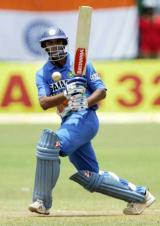The ICC's decision to grant the Africa-Asia one-day series official status has opened up, once again, the debate over the sanctity of game and international records. Two of Cricinfo's journalists present opposing sides of the argument. We welcome your participation too.
Dileep Premachandran - Glorified exhibition games

|

Rahul Dravid will be playing for Asia against Africa in an offical one-day international
© Getty Images
|
|
Before you set out to play for Lags XI against the Zimmer Frames XI at the park next weekend, it might be wise to ask the ICC first whether it'll grant the match official status. Your chances will be unimaginably brighter if you can rope in some fat-cat American pharmaceutical giant anxious to promote its latest anti-ageing pill as a sponsor.
Judging by how the official status label is now bestowed on every meaningless hit-about in coloured clothing, and given the ICC's penchant for bending over backwards to appease sponsors - remember World Cup and Champions Trophy spectators being told what soda to drink and what crisps to eat? - you might just be on to a win-win proposition.
It started with the controversy over Australia's matches against the Rest of the World later this year. Even those who admitted that such a match would provide a great contest had reservations about extending it official status, given the dangerous precedent that would be set. And sure enough, since then, even games for tsunami relief have been given the seal of legitimacy.
The latest unknown-parentage child up for baptism is the three-match series between an Asian XI and its African counterpart. The brainchild of the Afro-Asian Cricket Council, this jamboree purports to promote the game on the two continents. According to the press release, 10 percent of the proceeds will go to charity and the rest to "developing the game" on the two continents. As is the case with the BCCI in India, it's likely to do little more than enrich board coffers while doing almost nothing for the game at the grassroots.
The unholy nexus between sponsors and administrators will also impact on the players, many of whom are already talking of the unrelenting nature of the playing schedule. One can safely assume that the Rahul Dravids, Shoaib Akhtars and Shaun Pollocks of this world were not consulted when it was arbitrarily decided to make them turn out for three glorified exhibition games. And given the pressure exerted by TV channels and sponsors, they will inevitably have to make an appearance, half-hearted or not.
And that brings us to the crux of the problem when it comes to such games. There's invariably nothing at stake, whether that be a parochial rivalry - like the War of the Roses, Mumbai-Delhi or NSW-Victoria - or national pride. Other than professional pride, there's nothing whatsoever to motivate a top performer turning out for Asia, Africa or Gondwanaland. If the matches for tsunami relief - noble cause though it was - proved anything, it was that such games will never amount to anything more than hit-and-giggle affairs.
The ICC's new flexibility on matters such as this is also partly the result of the machinations of men like Jagmohan Dalmiya, who seem hugely reluctant to give their privileged status. Tomorrow, it's Asia-Africa, and once that runs its course, it will be Left-handers v Right-handers or whatever else can draw in the sponsors. So while several towns and cities across Asia go without even a half-decent turf pitch, and while national women's teams struggle to even meet expenses for tours, white elephants like the new AACC gobble up funds promoting nonsensical official matches.
A player swearing in frustration at an edged four can bring the game into disrepute, but not the administrator who spits in the face of the game's time-honoured traditions in order to keep the money-men happy. Then again, this is cricket, the game where the leading administrator's salary is nearly twice what its greatest exponent - Sachin Tendulkar - takes home as match fees. Like Alice in Wonderland, misguided by the Mad Hatter and the Cheshire Cat, players and fans will continue to wander, pausing occasionally to think of how a beautiful dream became a nightmare.
Andrew Miller - Creating a global game

|

Canada will soon be able to play more ODIs, as the ICC try to spread cricket around the world
© Getty Images
|
|
They are scattering one-day caps like confetti these days. The ICC's global membership is now nudging towards 100; Bermuda and Ireland are set to take on the big boys at the 2007 World Cup, and before we know it, Australia will be taking on Belgium as a pre-Ashes warm-up in 2009. This is, of course ... a very good thing indeed.
Cricket has, for far too long, been a closed shop to aspiring nations - a non-stop round-robin of matches between the elite eight nations, with the odd nod to Bangladesh and Zimbabwe and a derisive sneer to everyone else further down the field.
But the ICC has clearly been thinking outside the box of late. What they have discovered, from the messy entertainment of Twenty20 cricket to the even messier new innovations in the NatWest Challenge, is that nobody considers one-day cricket to be sacred.
Entertainment, pure and simple, is the order of the day, and what better way to ensure the best entertainment than to grant all participants an equal right to the spoils of posterity? Glenn McGrath's 7 for 15 against Namibia in the 2003 World Cup, for instance, will not be recalled as his most glorious spell, but it did, for an instant, give Mr Average in the public an insight into the sort of gulf that truly exists between the best and the rest.
With that in mind, it is right and proper that the Africa v Asia matches that have been scheduled for this August should be given the full trappings of ODI status. If the game is to form proper roots in countries such as Uganda and Malawi, who already have a curious and willing interest in cricket, then players of the stature of Shaun Pollock, Rahul Dravid and Shoaib Akhtar must be allowed to feel that their exhibition match has an edge to it.
Pollock himself remembers what it is like to play in a high-profile game without status - the Centurion match against India in 2001-02 was stripped of Test status by the ICC after the Mike Denness affair, and Pollock, who even scored a century, admitted afterwards that the game had been conducted in a muted atmosphere - and all for want of a single critical word. The personalities might have been the same, but the point was distinctly lacking.
Test cricket, of course, remains a separate issue entirely. The recent Bangladesh mismatches were awful in their inevitability and reinforced many people's belief that Test status should be even more elitist than it currently is.
One-day cricket, on the other hand, is a window onto a new world of opportunity for the ICC. Yes, it is an opportunity to expand the coffers as well, and as such it will attract inevitable criticism. But it is a foolish game that, in this modern globalised world, sits tight and relies entirely on its flimsy foundations for a fan base.



